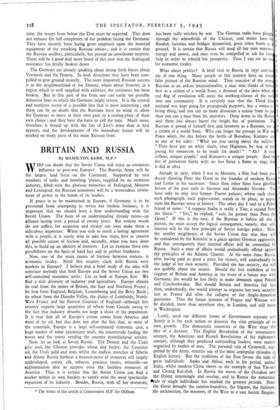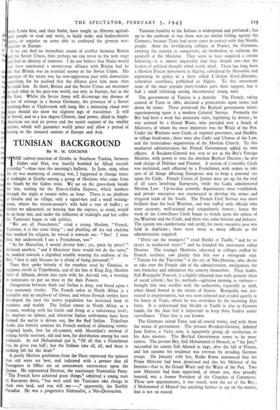BRITAIN AND RUSSIA
By HAMILTON KERR, M.P.*
WHO can doubt that the Soviet Union will enjoy an enormous influence in post-war Europe? The Russian Army will be the largest land force on the Continent. Supported by vast numbers of tanks and bombing 'planes, supplied by an immense industry, filled with the glorious memories of Stalingrad, Moscow and Leningrad, the Russian armament will be a tremendous instru- ment of power in the hands of its leaders.
If peace is to be maintained in Europe, if Germany is to be prevented from attempting to revive her broken fortunes, it is important that we should have a firm understanding with the Soviet Union. The basis of an understanding already exists—an alliance lasting over a period of twenty years. But written words do not suffice, for suspicion and rivalry can soon make them a ridiculous imposture. When you seek to reach a lasting agreement with a people, it is surely wise to take two steps, first to remove all possible causes of friction and, secondly, when you have done this, to build up an identity of interests. Let us examine these two possibilities on the basis of hard fact and in perfect frankness.
Now, one of the main causes of friction between nations is economic rivalry. Need this country clash with Russia over markets in Europe? I believe that a brief study of the atlas will convince anybody that both Europe and the Soviet Union are two self-contained economic units. Let us look at Europe first. We find a rich diversity of industry and agriculture. Europe obtains its coal from the mines of Britain, the Saar and Northern France ; Its iron from England, Belgium, Luxembourg and the Briey. Basin ; its wheat from the Danube Valley, the plains of Lombardy, North- West France and the Eastern Counties of England—although this country imports large quantities of wheat from Canada owing to the fact that industry absorbs too large a share of the population. It is true that all of Europe's cotton comes from America and most of its oil, but this does not alter the fact that, in most of the essentials, Europe is a large self-contained economic unit, a huge market of some 350,000,000 souls, the countryside feeding the towns and the towns sending the country manufactured articles.
Now, let us look at Soviet Russia. The Donetz and the Urals give coal, the Ukraine provides wheat and barley, the Caucasus oil, the Urals gold and iron, whilst the endless stretches of Siberia and Asiatic Russia harbour a treasure-trove of resources still largely undeveloped, cotton, silk, tobacco, precious stones, minerals—an agglomeration able to surpass even the limitless resources of America. Thus it is certain that the Soviet Union can find a market within its own borders to satisfy even the most spectacular expansion of its industry. Besides, Russia, with all her resources, * The writer of this article is Conservative M.P. for Oldham. has been sadly stricken by war. The German tanks have plo through the wheatfields of the Ukraine, coal mines have flooded, factories and bridges dynamited, great cities burnt to ground. It is certain that Russia will need all her own reserves energy and power, and may even be compelled to ask for for help in order to rebuild her prosperity. Thus I can see no ca for economic rivalry.
What about politics? A brief visit to Russia in 1937 convin me of one thing. Many people in this country have an entir. si false picture of the Russian mind. They conceive of the avera Russian as an ardent internationalist, a man who thinks of him h first as a citizen of a world State, a dreamer of the days when red flag of revolution will unite the working-classes of the wor into one community. It is certainly true that the Third In national was kept going for propaganda purposes, but a nation is living thing, and you can no more dissociate a nation from its pa than you can a man from his ancestors. Dcep down in the Russ' soul there has always burnt the bright fire of patriotism. Russian is proud of himself first and foremost as a Russian, not a citizen of a world State. Who can forget the passage in War an Peace when, the day before the battle of Borodino, Kutuzov say to one of his aides : " What are you saying about the militia? " They have put on white shirts, your Highness, by way of pre paring for tomorrow, to be ready for death! " " Ah! A mar vellous, unique people," said Kutuzov—a unique people. And th fire of patriotism burns with no less fierce a flame in 1943 di it did in 1812.
Already in 1937, when I was in Moscow, a film had been pr duced showing Peter the Great as the founder of modern Russi and Lenin as his successor. Since then other films have glorifie heroes of the past such as Suvorov and Alexander Nevsky. Yo have only to step into former Tsarist palaces, where each chair each photograph, each paper-cutter, stands in its place, to appre
date the Russian sense of history. The other day I said to a Polish friend of mine: " I suppose Stalin is really a Tsar, a second Peter the Great." " Yes," he replied, " only far greater than Peter the Great." If this is the case, if the Russian is before all else a patriot, we must accept the logical consequence, namely, that self- interest will be the first principle of Soviet foreign policy. Now, the smaller neighbours of the Soviet Union fear that they will be considered by the Kremlin as a glacis against German aggression, and that consequently their internal affairs will be controlled by Russia. Such a state of affairs would undoubtedly offend against the principles of the Atlantic Charter. At the same time, Russia, after having paid so great a price for victory, will undoubtedly be the judge of her own security. Provided she has security, she will not quibble about the means. Should she feel confident of the support of Britain and America in the event of a future war with Germany, she would be less likely to make demands upon Poland and Czechoslovakia. But should Britain and America fail her, then, undoubtedly, she would attempt to organise her own security, just as France did after the cojiapse of the Anglo-American guarantee. Thus the future position of Prague and Warsaw will be decided, more than anywhere else, in London, and still more in Washington.
Lastly, need our different forms of Government separate us? Surely it is for each nation to discover the vital principle of its own growth. The democratic countries of the West shun the idea of a dictator. The English Revolution of the seventeenth century, the American and French Revolutions of the eighteenth century, although they produced outstanding leaders, were mainly orkanised by bodies of men. The personal rule of Cromwell, sup- ported by the Army, remains one of the most unpopular episodes in English history. But the traditions of the East favour the rule of great individuals. Asoka and Akbar, each in his period, united India, whilst modern China shows us the example of Sun Yat-sen and Chiang Kai-shek. In Russia the waves of the Occident and the Orient intermingle and overlap, and in Russia the autocratic tittle of single individuals has marked the greatest periods. Peter the Great brought the cannon-foundries, the frigates, the fashions, the architecture, the manners, of the West to a vast Asiatic Empire, ile Lenin first, and then Stalin, have taught an illiterate agricul- ral people to read and write, to build tanks and hydro-electric plants, to organise an army able to confound the greatest war- 'achine in Europe.
es If we can find no iinnaediate causes of conflict between Britain and the Soviet Union, then perhaps we can move to the next stage and find an identity of interests. I- do not believe that Stalin.would ever have sanctioned a twenty-year alliance with Britain had he felt that Britain was an eventual enemy of the Soviet Union. His signature of the treaty was his non-aggression pact with democratic capitalism, for he realised that the alliance gave him more than he could lose. In short, Britain and the Soviet Union are necessary to each other in the post-war world, not only in Europe, but in the Far East. Whilst the Soviet Army will discourage any dreams of a war of revenge in a beaten Germany, the presence of a Soviet bombing-fleet at Vladivostok will hang like a menacing cloud over Japan should she show the slightest sign of truculence. It will be Soviet, and to a less degree Chinese, land power, allied to Anglo- American sea and air power and the moral support of the smaller nations, which will guarantee world peace and allow a period of healing to the tortured nations of Europe and Asia.



























 Previous page
Previous page